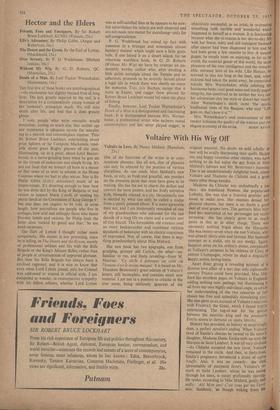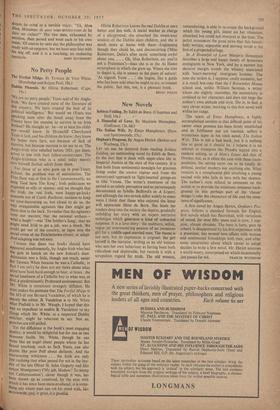Voltaire With His Wig Of
ONE of the functions of the writer is to com- municate pleasure; like all arts, that of pleasure can only be enjoyed by the practice of various disciplines. As one reads Miss Mitford's new book, so airy, so fresh and graceful, one ponders on the immense pains that must have gone to its making. She has the wit to charm the dullest and convert the most austere, and her lively narrative style, blessedly relaxed, is a joy. Occasionally one is startled by what can only be called a nudge from a pretty pointed elbow. It is more agreeable than not, and I am irrelevantly reminded of one of my grandmothers who subsisted for the last decade of a long life on claret and a certain sort of thin biscuit. This formidable old creature used an ivory backscratcher and combined ruthless standards of behaviour with an electric coarseness of expression. Not, of course, that there is any- thing grandmotherly about Miss Mitford.
Her new book has two epigraphs, one from grudging, grumpy old Carlyle, the other—un- familiar to me, and finely revealing—from M. Mauriac : 'Ce siecle d perruque est celui ou l'homnze s'est le ',loins masque.' It is based on Mr. Theodore Besterman's great edition of Voltaire's letters, still incomplete, and contains much new material. I am not in a position to criticise in the true sense, being sublimely ignorant of the original material. No doubt an acid scholar two will be avidly sharpening their quills. Hat me, and happy countless other readers, who hi nothing to do but enjoy the gay fruits of IV Mitford's labours and Mr. Besterman's learni This is an unadulteratedly delightful book, abt Voltaire and Madame du Chatelet and a gr many other things besides.
Madame du Chatelet was undoubtedly a bleu: she translated Newton, she populari. Leibnitz. She was also a frenzied gambler a loved to make love. Her enemies denied I physical charms, but there is no doubt a gc deal of sour grapes here. The portraits Miss 1'v ford has assembled of her personages are rea revealing: she has clearly gone to as mt pains in this as in other things. There v obviously nothing frigid about the Marqui She was twenty-seven when she met Voltaire, w was already thirty-nine and famous. Her husba emerges as a stolid, not to say stodgy, figu happiest away on his military duties, complact at Voltaire's presence in his château of Cirey remote Champagne, where he shed a singula happy, active, loving lustre.
Apart from giving a- revealing account of famous love affair of a sort that only eighteen' century France could have provided, Miss M ford has excellent pages on Voltaire in Englar adding nothing new, perhaps, but illuminating all from her own highly individual angle, in whi her understanding of the two countries of choice has free and splendidly stimulating pk, She also gives us an account of Voltaire's relat:o with Frederick the Great, which I found high. entertaining. The tug-of-war for the geni between the neurotic king and the possessi Emilie seems to demand an opera libretto. Apart from giving a- revealing account of famous love affair of a sort that only eighteen' century France could have provided, Miss M ford has excellent pages on Voltaire in Englar adding nothing new, perhaps, but illuminating all from her own highly individual angle, in whi her understanding of the two countries of choice has free and splendidly stimulating pk, She also gives us an account of Voltaire's relat:o with Frederick the Great, which I found high. entertaining. The tug-of-war for the geni between the neurotic king and the possessi Emilie seems to demand an opera libretto.
History has provided, as history so surprising does, a perfect novelist's ending. When Voltai tired of Emilie's charms he turned to his sister daughter, Madame Denis. Emilie took up with tl Marquis de Saint Lambert. It was all very civil's' —du Chatelet accepted the new lover, Volta' remained in the circle. And then, at forty-foe Emilie's pregnancy introduced a strain of opt' !wage. Alas, it was no comedy : she di' (presumably of puerperal fever). Voltaire's r mark to Saint Lambert, whom he was seen through his tears, is surely profoundly movin He spoke, according to Miss Mitford, gently ar sadly : 'Ah! Mon anti! C'est vous qui me l'ao tuee.' Suddenly, 'as though waking from 11
dream he cried in a terrible voice : "Eh, Mon Dieu, Monsieur, de quoi vows avisiez-voter de lid faire un enfant?" The two men, exhausted by emotion, then parted and went each to his own room.' Of course by next day the philosopher was ready with an epigram; but we have seen him with his wig off, and it is a touching, an endearing



































 Previous page
Previous page